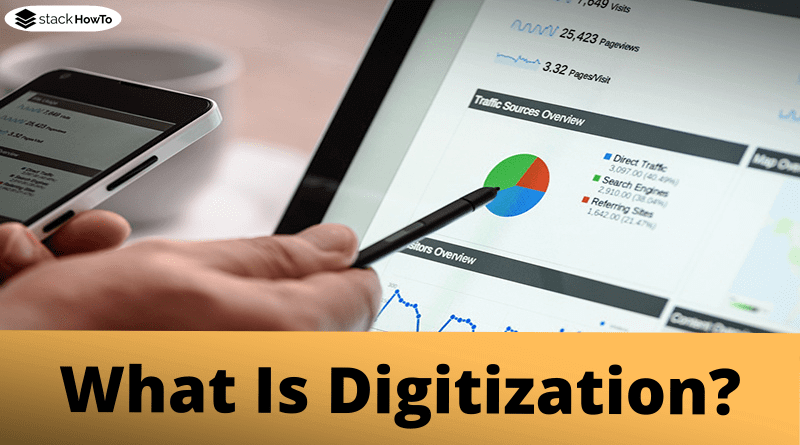What Is Digitization?
Digitization is the generic term for the digital transformation of society and the economy. It describes the transition from an industrial age characterized by analog technologies to an age of knowledge and creativity characterized by digital technologies and digital business innovations.
Digitization – Converting information into digital formats
Digitization means transforming all information from analog to digital form. Probably the most popular example is creating an electronic version of a book (e-book) from the paper format. The reason digitization plays such an important role in organizations, administrations, and in the business world is the ability to get work done much faster, smoother, and more efficiently.
The result of digitization is the representation of an object, image, sound, document, or signal (usually an analog signal) by generating a series of numbers that describe a discrete set of its points or samples. The result is called the digital representation, or more precisely the digital image for the object and digital form for the signal. In modern practice, digitization simply means converting analog source material into a numerical format. The decimal number or another number system can be used for the representation.
The areas of digitization – Who is driving digitization?
In recent years, around 2000, various digital technologies (mobile Internet, artificial intelligence, Internet of Things, etc.) have developed very quickly. This made the transition from expert application to people’s everyday life.
Just as the innovation of the steam engine and the spread of electricity has changed society, digitalization is also changing the economy and society.
Digitization is technology-driven. Digital innovations arise on the basis of the new digital technologies. Innovations are driven on the one hand by established companies and on the other hand by start-ups and venture capital. This leads to the digitization of different speeds.
For example, while the public administration is still working with paper documents, the markets are changing much faster. The music and media industry was the first to experience the effects of digitization. Retail followed. Almost all industries are affected by the different fields of digitization.
Digitization determines the future of the economy and society
What effects will digitization have on the future? The digital transformation is a radical change in the economy and society that has taken place over a long period of time.
It started in the early 1990s with the spread of the internet and the advent of services like AOL and Compuserve. Digitization was driven by the increase in Internet connections at the end of the nineties and the first hype around the turn of the millennium. High-speed internet and mobile data access also triggered. In the future, an even faster mobile Internet (5G), combined with the technologies of the Internet of Things and artificial intelligence, will enable the increased use of robotics applications. Digitization will drastically change the future of the economy. Examples of the effects of digitization on the future of various industries:
- Digitization will radically change the future of the automotive industry through new mobility concepts. From autonomous driving and existing sharing models to completely new concepts such as the rental of electric scooters, digitalization will make new usage models possible in the future.
- Digitization influences the future of the financial industry. Technologies such as blockchain enable new applications such as virtual currencies and new forms of corporate finance and participation.
- Traditional professions are also being changed by digitalization. Soon doctors will be increasingly supported by applications of e-health, especially in diagnostics. Services in the legal sector (today mostly provided by lawyers) are supplemented or replaced by digital services from the legal tech sector.
In the future, digitization will bring new challenges for schools and education, training and further education, public administration, and associations. It is the responsibility of businesses, associations, and politics to prepare society for the changes to be expected in the future as a result of digitization.
In which areas has digitization already advanced?
The most advanced is digitization in companies. Global competition affects companies of all sizes. That is why companies have started to digitize their internal processes and procedures and, on the other hand, to develop new services and digital business models. However, this development is far from over. With digitization, the challenge for companies is to identify new customer needs due to the increasing acceptance of digital services and apps.
Due to digitization, companies are forced to concentrate their actions on the development of digital innovations in order to be successful in digital change.
Customers are much better informed today than they were when the Internet was only just widespread. New technologies such as artificial intelligence and blockchain will radically change business models and companies by 2040. Innovative software is already helping companies to drive digital change. Various innovation networks are set up and managed within a company, which systematically promote digitization in the company.
Is there still room for improvement?
While the digital transformation is being driven forward in companies, administration and authorities are lagging behind. But more and more citizens are calling on governments to follow the example of industry and provide digital services.
However, digitizing an agency requires two important considerations to be considered: the core competencies for engaging citizens and businesses, and the organizational prerequisites that support these skills. These form a framework for setting digital priorities.
The key to a good digital service is to understand the user’s perspective. Authorities must be ready to redesign products, processes, and guidelines to meet the needs of citizens. In Norway, for example, 70 percent of citizens submit their tax returns online. Providing services on mobile platforms is another way that citizens can use digital services.
Which courses are important for digitization?
Digitization will change our lives and the way we work. Some jobs will disappear, others will grow in importance, and jobs that don’t exist today will become commonplace. What is certain is that future employees will have to adapt their skills in order to keep up.
The fourth industrial revolution, the developments in previously underdeveloped areas such as artificial intelligence and machine learning, robotics, nanotechnology, 3D printing as well as genetics and biotechnology, will massively change not only business models but also tomorrow’s labor markets. Well-founded knowledge in these areas is the best prerequisite for successfully encountering digitization.





